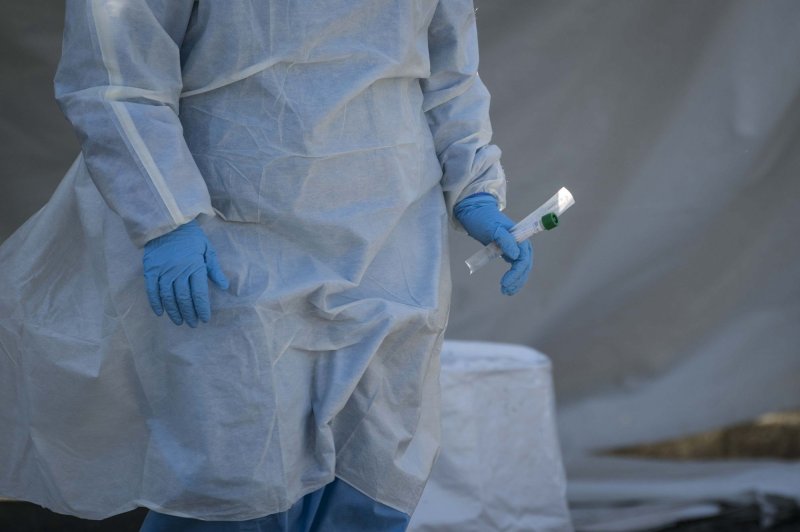Great Plains Indian reservations report 17% spike in COVID-19 cases

To date, Native American reservations in Iowa, Nebraska and North and South Dakota have reported 38,000 confirmed cases of COVID-19. Photo by Sarah Silbiger/UPI | License Photo
May 28 (UPI) -- American Indian tribal reservations in the Great Plains region of the United States have seen a 17 percent uptick in confirmed COVID-19 cases in the past week, researchers said.
The data is "shining a light" on disparities in overall health and access to care in these communities, Dr. Donald Warne, an expert in Indian health issues said Thursday
The tribes, including Warne's own Pine Ridge, S.D.-based Oglala Lakota, now join the Navajo nation in New Mexico and Arizona and dozens of other American Indian and Alaska Native communities impacted by the new coronavirus, SARS-CoV-2.
"We are seeing exponential growth in cases in the Northern Plains tribes, and they need resources," Warne, Indians Into Medicine program director at the University of North Dakota, told reporters on a conference call hosted by the Robert Wood Johnson Foundation.
RELATED High diabetes rates put Native Americans at greater risk for heart disease, AHA says
"Most reservations don't have hospitals, and those that do don't have intensive-care units or ventilators," he said.
To date, reservations in Iowa, Nebraska and North and South Dakota have reported 38,000 confirmed cases of COVID-19, according to the Great Plains Tribal Epidemiology Center. There are 5.2 million people who identify as American Indian or Alaska Natives nationally, based on 2010 U.S. Census data.
American Indians and Alaska Natives account for less than 2 percent of total population of the United States, Warne said. And, current case figures are likely underestimates because 70 percent of American Indians live in urban areas and 78 percent reside outside of sovereign tribal nations, he said.
More than 4,700 people have been infected with the new coronavirus in the Navajo nation in New Mexico and Arizona, according to the Navajo Department of Health. Many of these cases have been traced "back to one large gathering," Warne said.
As a result, most tribes in the Great Plains region have cancelled large gatherings, including annual "sun dances," he said, adding, "So, the outbreak is having an impact on cultural practices."
Testing issues have complicated efforts to combat the virus on many reservations, Warne noted.
As a result, most tribes in the Great Plains region have cancelled large gatherings, including annual "sun dances," he said, adding, "So, the outbreak is having an impact on cultural practices."
Testing issues have complicated efforts to combat the virus on many reservations, Warne noted.
RELATED Doctors Without Borders sends teams to New Mexico to assist Native Americans
Nationally, clinicians have performed nearly 15.8 million COVID-19 tests, according to the U.S. Centers for Disease Control and Prevention. However, fewer than 340,000 Great Plains tribal members have been screened for the virus so far, the Great Plains Tribal Epidemiology Center reports.
Among those who have been diagnosed with COVID-19 on reservations in the region, 742 have died.
Higher rates of Type 2 diabetes, heart disease, cancer and tobacco use -- as well as poverty, inadequate housing and limited access to healthcare -- among reservation residents "puts our people at greater risk for bad outcomes" from the disease, Warne said.
"Every day, remote reservation communities face shortages of food, water and healthcare, and COVID-19 has magnified that reality," Joshua Arce, president and CEO of Partnership With Native Americans, said in a statement.
Thursday's call was part of a Robert Wood Johnson Foundation initiative entitled "Health Equity in Real Time with COVID-19: COVID-19's Impact on American Indians, from Sovereign Tribal Nations to 'Invisible' Urban Communities."
The challenge reservations face in combating the virus is both a "policy issue and social justice issue," Warne told reporters.
Although historical treaties tribes signed with the U.S. government led to the establishment of the Indian Health Service, which provides care to 2.2 million recognized tribal members, Warne said the program is underfunded.
In 2013, for example, the health service spent an average of $2,849 per person on healthcare, compared to the $7,717 per person paid out nationally, according to the National Congress on American Indians.
Expenditures for Indian Health Service beneficiaries are lower than those for the U.S. prison population, Warne said. As a result, many tribes "don't have the necessary infrastructure for lab testing or contract tracing for COVID-19," he said.
"Some tribes are doing better than others in terms of response to the outbreak, but those are generally the ones with more resources," Warne said.
"American Indians are dying of neglect, and we need non-Indian advocates to recognize that there is an indigenous health crisis in the United States."
No comments:
Post a Comment